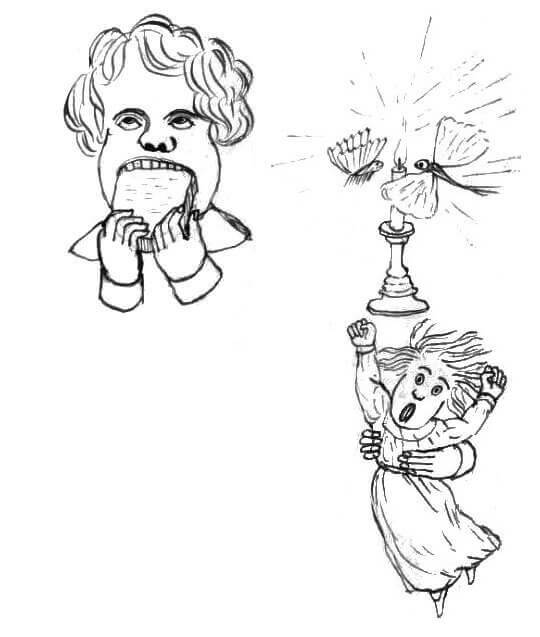Fair stands the ancient1 Rectory,
The Rectory of Croft,
The sun shines bright upon it,
The breezes whisper soft.
From all the house and garden
It’s inhabitants come forth,
And muster in the road without,
And pace in twos and threes about,
The children of the North.

Some are waiting in the garden,
Some are waiting at the door,
And some are following behind,
And some have gone before.
But wherefore all this mustering?
Wherefore this vast array?
A gallant feat of horsemanship
Will be performed today.
To eastward and to westward,
The crowed divides amain,
Two youths are leading on the steed,
Both tugging at the rein:
And sorely do they labour,
For the steed2 is very strong,
And backward moves it’s stubborn feet,
And backward ever doth retreat,
And drags it’s guides along.
And now the knight hath mounted,
Before the admiring band,
Hath got the stirrups on his feet,
The bridle in his hand.
Yet, oh! beware, sir horseman!
And tempt thy fate no more,
For such a steed as thou hast got,
Was never rid before!
The rabbits3 bow before thee,
And cower in the straw;
The chickens4 are submissive,
And own thy will for law;
Bullfinches and canary
Thy bidding do obey;
And e’en the tortoise in it’s shell
Doth never say thee nay.

But thy steed will hear no master,
Thy steed will bear no stick,
And woe to those that beat her,
And woe to those that kick5!
For though her rider smite her,
As hard as he can hit,
And strive to turn her from the yard,
She stands in silence, pulling hard
Against the pulling bit.
And now the road to Dalton
Hath felt their coming tread,
The crowd are speeding on before,
And all have gone ahead.
Yet often look they backward,
And cheer him on, and bawl,
For slower still and still more slow,
That horseman and that charger go,
And scarce advance at all.
And now two roads to choose from
Are in that rider’s sight:
In front, the road to Dalton,
And New Croft upon the right.
“I ca’n’t get by!” he bellows,
“I really am not able!
“Though I pull my shoulder out of joint,
“I cannot get him past this point,
“For it leads unto his stable!”
Then out spake Ulfrid Longbow,6
A valiant youth was he
“Lo! I will stand on thy right hand,
“And guard the pass for thee.”
And out spake fair Flureeza,7
His sister eke was she,
“I will abide on thy other side,
“And turn thy steed for thee.”
And now commenced a struggle
Between that steed and rider,
For all the strength that he hath left,
Doth not suffice to guide her.
Though Ulfrid and his sister
Have kindly stopped the way,
And all the crowd have cried aloud,
“We ca’n’t wait here all day!”

Round turned he, as not deigning
Their words to understand,
But he slipped the stirrups from his feet,
The bridle from his hand
And grasped the mane full lightly,
And vaulted from his seat,
And gained the road in triumph,8
And stood upon his feet.
All firmly till that moment
Had Ulfrid Longbow stood,
And faced the foe right valiantly,
As every warrior should.
But when safe on terra firma
His brother he did spy,
“What did you do that for?” he cried,
Then unconcerned he stepped aside
And let it canter by.
They gave him bread and butter,9
That was of public right,
As much as four strong rabbits,
Could munch from morn to night.
For he’d done a deed of daring,
And faced that savage steed,
And therefore cups of coffee sweet,
And everything that was a treat,
Were but his right and meed.
And often in the evenings,
When the fire is blazing bright,
When books bestrew the table,
And moths obscure the light,
When crying children go to bed,
A struggling, kicking load,
We’ll talk of Ulfrid Longbow’s deed,
How, in his brother’s utmost need,
Back to his aid he flew with speed,
And how he faced the fiery steed,
And kept the New Croft Road.

- this Rectory has been supposed to have been built in the times of Edward the sixth, but recent discoveries clearly assign its origin to a much earlier period. A stone has been found in an island formed by the river Tees, on which is inscribed the letter “A,” which is justly conjectured to stand for the name of the great king Alfred, in whose reign this house was probably built. ↩
- the poet entreats pardon for having represented a donkey under this dignified name. ↩
- with reference to these remarkable animals see “Moans from the Miserable” page 12. ↩
- a full account of the history and misfortune of these interesting creatures may be found in the first “Lay of Sorrow.” page 36. ↩
- it is a singular fact that a donkey makes a point of returning any kicks offered to it. ↩
- this valiant knight besides having a heart of steel, and nerves of iron, has been lately in the habit of carrying a brick in his eye. ↩
- she was sister to both. ↩
- the reader will probably be at a loss to discover the nature of this triumph, as no object was gained, and the donkey was obviously the victor, on this point however, we are sorry to say, we can offer no good explanation. ↩
- much more acceptable to a true knight than “cornland” which the Roman people were so foolish as to give to their daring champion, Horatius. ↩